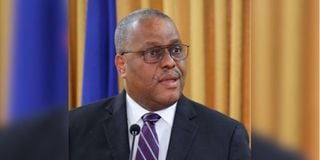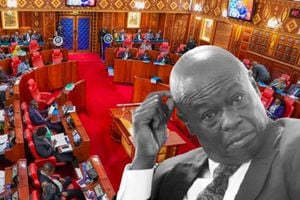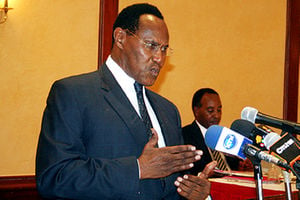Haiti Prime Minister heads to Kenya amid rise in gang violence

Haiti transitional Prime Minister Garry Conille.
Haiti transitional Prime Minister, Dr Garry Conille, is expected in Nairobi on Friday for talks on his country’s security, a trip that comes as gangs invade some towns in his homeland.
An itinerary published by his office said he would tour the United Arab Emirates and Kenya from Saturday October, 2024 to Friday, October 11 this week.
The main purpose of his trip is to discuss with President William Ruto the arrival of the next contingent of police officers as part of the Multinational Security Support (MSS) mission to Haiti, which Kenya is leading.
“The Head of the Haitian Government, Dr Garry Conille, will also meet, during this mission, with his counterpart from the United Arab Emirates, to discuss with him partnerships in new technologies and technical assistance in security areas,” the Haitian government said.
He will also hold a series of meetings with willing African countries to discuss the security crisis and opportunities for Haiti. During Dr Conille's visit to Africa, Haiti's Minister of Justice and Public Security, Carlos Hercule, will act as interim prime minister.
The MSS's mandate was renewed for another year last month, but it has been plagued by a lack of funding, with donor pledges slow to materialise. Although not a peacekeeping mission, the MSS is endorsed by the UN Security Council on the understanding that it will be funded by donors on a voluntary basis. So far, the US, UK, France and Canada have contributed. Kenya has about 400 police on the ground, joined by a small unit of Jamaican soldiers.
The Prime Minister's visit comes barely three weeks after President William Ruto visited the Caribbean nation.
During his visit, Ruto assured the Kenyan officers that the government would give them all the support they needed. He also promised that by January, Nairobi would have deployed all the 1,000 police officers it had pledged to the MSS. The MSS itself is expected to have 2,500 troops.
Kenya leads the MSS under its commander Godfrey Otunge. President Ruto did not give a date for the deployment of the remaining 600 officers.
In Haiti, police officers spoke of the challenges they face and specifically asked for more resources.
The MSS said it had helped secure parts of Porto-Au-Prince that were initially in the hands of gangs. But limited resources mean they cannot go further, and gangs have recently taken advantage and massacred villagers in outlying towns, creating a new humanitarian crisis. So far, the mission says it has arrested two gang leaders who are in police custody. The two gang leaders are members of the Chen Mechan and Pierre 6 gangs.
Jimmy Cherizier, alias Barbecue, a former police officer and one of the most feared gang leaders, had given mixed signals when the MSS arrived, first offering an olive branch to the new prime minister, before declaring the MSS invaders.
“The police did not stop, they even came to almost the place that I was and they were shooting and also used teargas canisters,” he said in one video.
However, a recent gang attack in the town of Pont-Sonde left at least 70 people dead and nearly 7,000 displaced.
The International Organization for Migration (IOM) reported that nearly 90 percent of the displaced are staying with relatives, while others have chosen to seek shelter in various locations and schools.
The Caribbean nation has suffered years of violence as gangs with close ties to the country's political and business leaders have vied for influence and control of territory.
In February 2024, there was an upsurge in attacks that led to the resignation of then-Prime Minister Ariel Henry.
This led to the formation of the Transitional Presidential Council, which chose Dr Conille to serve as Prime Minister until the country went to elections.
So far, Kenya and Jamaica are the only countries to have sent officers to Haiti.
Other countries that have promised to do so but have yet to send their officers include the Bahamas, Antigua, Barbuda, Italy, Spain, Mongolia, Senegal, Belize, Suriname, Guatemala and Peru.





